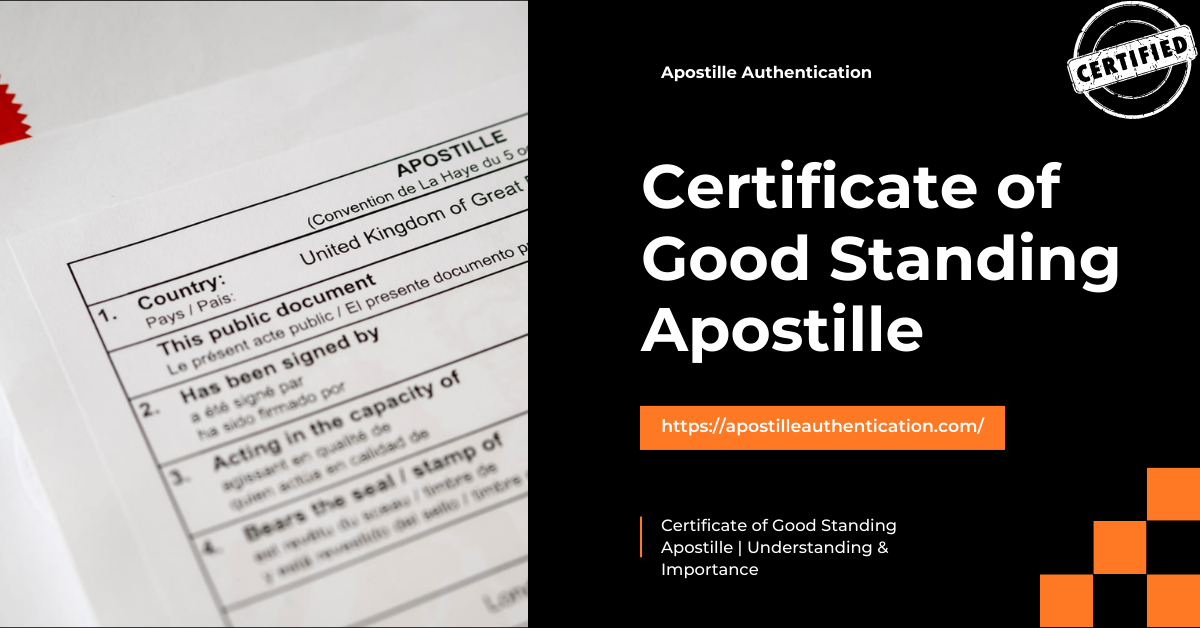In a world where legalities cross borders, the Certificate of Good Standing Apostille has become a crucial document for various purposes. Whether you’re involved in international business or legal affairs, understanding the ins and outs of this certificate is essential.
The Certificate of Good Standing
Definition and Purpose
A Certificate of Good Standing is a document issued by a relevant authority, indicating that a business entity is in compliance with all statutory requirements. It attests to the entity’s legitimacy and good standing within its jurisdiction.
Issuing Authorities and Procedures
Obtaining a Certificate of Good Standing involves specific procedures determined by the jurisdiction. Different authorities may issue this certificate, such as state agencies or chambers of commerce.
The Apostille Process of Good Standing
Steps Involved in Obtaining an Apostille
To obtain an Apostille, you need to follow a series of steps. These typically include notarizing the document, obtaining the Certificate of Good Standing, and submitting it to the relevant government agency for authentication.
Common Challenges and Solutions
While the process may seem straightforward, challenges can arise. Delays, errors, and misunderstandings can occur, but understanding these challenges can help you navigate them successfully.
Why You Need a Certificate of Good Standing Apostille
Legal Requirements
In many international transactions, a Certificate of Good Standing Apostille is a legal requirement. It provides assurance to foreign entities that you are a trustworthy and compliant business partner.
Business Transactions and International Dealings
Whether you’re entering into contracts, forming partnerships, or expanding your business globally, having this certificate can streamline processes and instill confidence in your counterparts.
Where to Obtain a Certificate of Good Standing Apostille
Government Agencies Responsible
Different jurisdictions may have specific agencies responsible for issuing Apostilles. Understanding the local requirements and procedures is crucial for a smooth process.
Online Services and Alternatives
In today’s digital age, many services offer online submission and processing of documents. Exploring these options can save time and simplify the entire Apostille process.
Key Information on the Certificate
Contents of the Certificate of Good Standing
Understanding what information the certificate contains is essential. It typically includes details about the entity, its registration status, and any disciplinary actions taken against it.
How to Interpret the Information
Interpreting the information on the certificate requires knowledge of the local laws and regulations. Being well-informed can help you make better decisions based on the content of the certificate.
Tips for a Smooth Apostille Process
Ensuring Document Accuracy
Errors in documents can lead to delays in the Apostille process. Double-checking and ensuring the accuracy of your paperwork is a crucial step.
Timely Submission and Follow-ups
Submitting your documents on time and following up on the progress can prevent unnecessary delays. Timely action is key to a smooth Apostille process.
Alternatives to Apostilles
Legalization Procedures
In some cases, alternatives to Apostilles may be necessary. Understanding the differences and when to choose one over the other is vital.
When to Choose an Alternative Approach
Certain situations may call for alternative approaches to document authentication. Knowing when to choose an alternative can save time and resources.
The Future of Apostilles
Evolving Trends in International Documentation
As technology advances and global interactions increase, the future of Apostilles is likely to see significant changes. Stay ahead of the curve by understanding emerging trends.
What to Expect in the Coming Years
Anticipating changes and developments in Apostille procedures can help you prepare for future document authentication needs. Proactive planning ensures you are always well-prepared.
Conclusion
In conclusion, the Certificate of Good Standing Apostille plays a crucial role in international transactions and legal matters. Understanding its significance, the process involved, and staying informed about alternatives and updates is essential for a seamless experience.
FAQs
Is a Certificate of Good Standing Apostille always required in international business transactions?
Yes, while not always mandatory, a Certificate of Good Standing Apostille is often required in international business transactions. This document serves as proof that a business entity is in compliance with all statutory requirements and is in good standing within its jurisdiction.
Can I obtain an Apostille online, or do I need to visit a government office?
Yes, , you can obtain an Apostille online from Us, eliminating the need to visit a physical government office. With advancements in technology, several government agencies now offer online Apostille services to enhance convenience and streamline the authentication process. This online option allows individuals and businesses to submit their documents digitally, saving time and reducing the logistical challenges associated with in-person visits.
What is the difference between an Apostille and document legalization?
An Apostille is a simplified method of authenticating documents for international use. It is a certificate issued by a competent authority in the country where the document originates, confirming its authenticity. The Apostille is recognized by countries that are part of the Hague Convention, simplifying the validation process.
On the other hand, document legalization is a more traditional and complex method. It involves a series of steps to authenticate a document, including notarization and certification by various authorities, such as consulates or embassies. Legalization is often required for countries that are not part of the Hague Convention.
Are there any situations where an Apostille may not be sufficient?
Yes, there are situations where an Apostille may not be sufficient for document authentication. While an Apostille is widely recognized and accepted in countries that are part of the Hague Convention, there are instances where additional requirements or alternative procedures may be necessary. Some situations include:
- Non-Hague Convention Countries
- Specific Document Requirements
- Bilateral Agreements
- Translations
How often should I check for updates on Apostille requirements?
Regularly checking for updates on Apostille requirements is advisable, especially if you frequently engage in international transactions or deal with documents for use abroad. The frequency of checking may depend on various factors, including:

